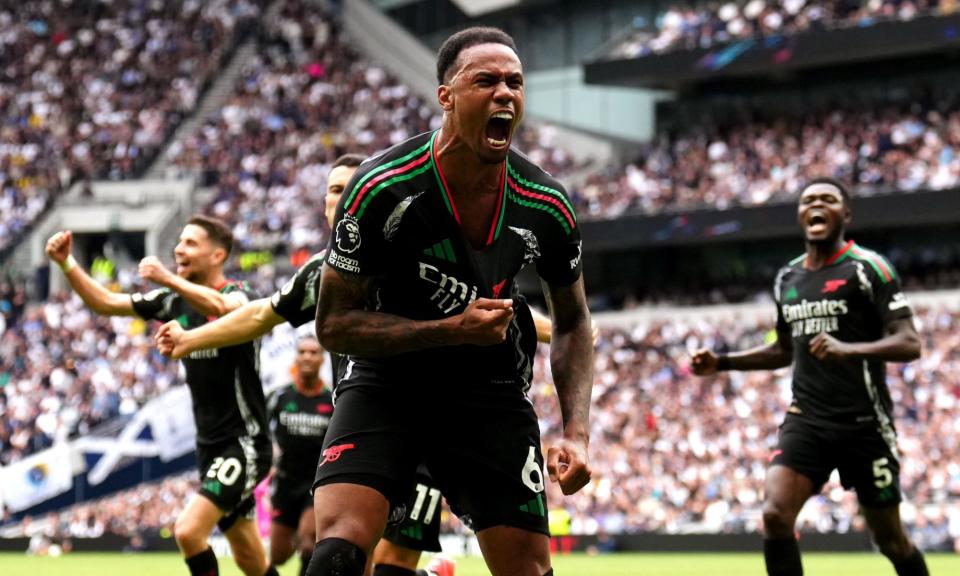Set-piece goal part of mania for detail that separates Arsenal from Spurs

Yes, well, of course that was going to happen. Ange Postecoglou has a particular manner on the touchline, a way of standing in the same spot for long periods of time, fists bunched in his pockets, a little hangdog and sad, like a long‑suffering dad at sports day.
As this slow-burn north London derby ticked down towards its inevitable endgame, as the sight of Arsenal’s set-piece coach leaping up at the edge of Postecoglou’s eyeline became ever more potent and ominous, there was a sense also of a man being chased down by the fates, like the doomed priest in The Omen, fate foretold by the shadow of the church spire sticking out of his back.
Related: ‘Best in his field’: Arteta lauds Arsenal’s Nicolas Jover for set-piece dominance
Let’s face it, this is how these things work. If you say you’re not interested in set pieces after losing one north London derby on set‑piece goals, and not interested because you just want to play a more expansive holistic game, football logic states very clearly that you will definitely lose the next one that way, too. And that you will do so after playing really quite well, with some nice holistic‑process stuff chucked in.
And so it came to pass here. In part because it was always going to, but mainly because Arsenal made it happen. It is a good cinematic detail that Mikel Arteta’s team won this game thanks to a single clean header from a corner. But zoom out a little and set-piece clarity is just part of the package, a symptom of this Arsenal era’s mania for detail.
This is a minutely planned sporting entity from pressing to passing combinations. So, yes, of course that includes corners, headers and getting in the way artfully. You don’t challenge for a league this way. But it certainly helps.
The decisive moment arrived on 64 minutes. It was a classic one‑two. As Bukayo Saka took a right-wing corner there was a distracting surge past the front post. The ball went to the back, where Gabriel Magalhães produced a wonderful wrench of the neck to thump his header into the back of the net.
It is an interesting part of the dynamic that for an hour it had been tempting to wonder if this was the kind of afternoon where Arsenal would miss having a sniper, a finisher, a one-shot killer. It was a scruffy game, not so much a boxing match as the football equivalent of the kind of brawl inside a Wetherspoons that ends on YouTube, all haymakers by the pool table and wild flying air-kicks.
Have there ever been so many bookings for pulling your man back in the centre circle? This was a free for all of pulling-back, no quarter asked, none given in the pulling‑back-in-the-centre-circle stakes.
It always seemed to be narrowing towards a moment. And as the goal went in the realisation arrived with it that Arsenal do have a killer in their ranks.
His name is Nicolas Jover, the set-piece specialist, who was immediately engulfed by a group coach hug, and who was still up on his feet looking a bit wild and emotional as the game restarted. You can add Gabriel to that too, whose goal here was the fifth time he has scored the winner for Arsenal.
It should be said that Postecoglou isn’t some kind of luddite anti-set piece fanatic. Spurs do have a new coach who takes care of this side of things. But Arsenal are just better at it. There were four Spurs set-piece deliveries into the box in the opening 10 minutes here, all of them won by Arsenal players quite comfortably.
Jover has been called a revolutionary, a game‑changer, a visionary. He certainly must have incredible thighs. His entire afternoon is basically a series of squats and leaps and sprints, as set pieces come and go. It is a slightly weird new dynamic all round. Will the set-piece coaches ever stop leaping up? Why don’t goalkeeping coaches leap up whenever there’s a shot or a penalty kick? Why don’t the analytic guys leap and stare intently from the touchline during each period of slow possession?
But then the current focus is also a fad to some degree, the Premier League and its broadcasters mining fresh meat, fresh content. Perhaps before long we can look forward to a set‑piece coach golden age, from the great Scottish mining stock set-piece coaches, a set-piece Clough a set-piece Ferguson, our first set-piece coach Mourinho, the smouldering bad boy?
The reality, of course, is that Arsenal won this game in many other ways, all of them connected to the same mania for detail and planning. The midfield was missing not just Declan Rice but Martin Ødegaard, but made up for it in energy and scuffle.
Jurriën Timber and Gabriel Martinelli looked like a classy little two-hander on the left at times. Leandro Trossard worked really hard in the centre, even managing to tear his shirt theatrically, opening up a door in his chest, C-3PO-style. Even the 17-year-old Ethan Nwaneri came on and battled impressively. By the end the details were enough. Including, of course the obvious one.

